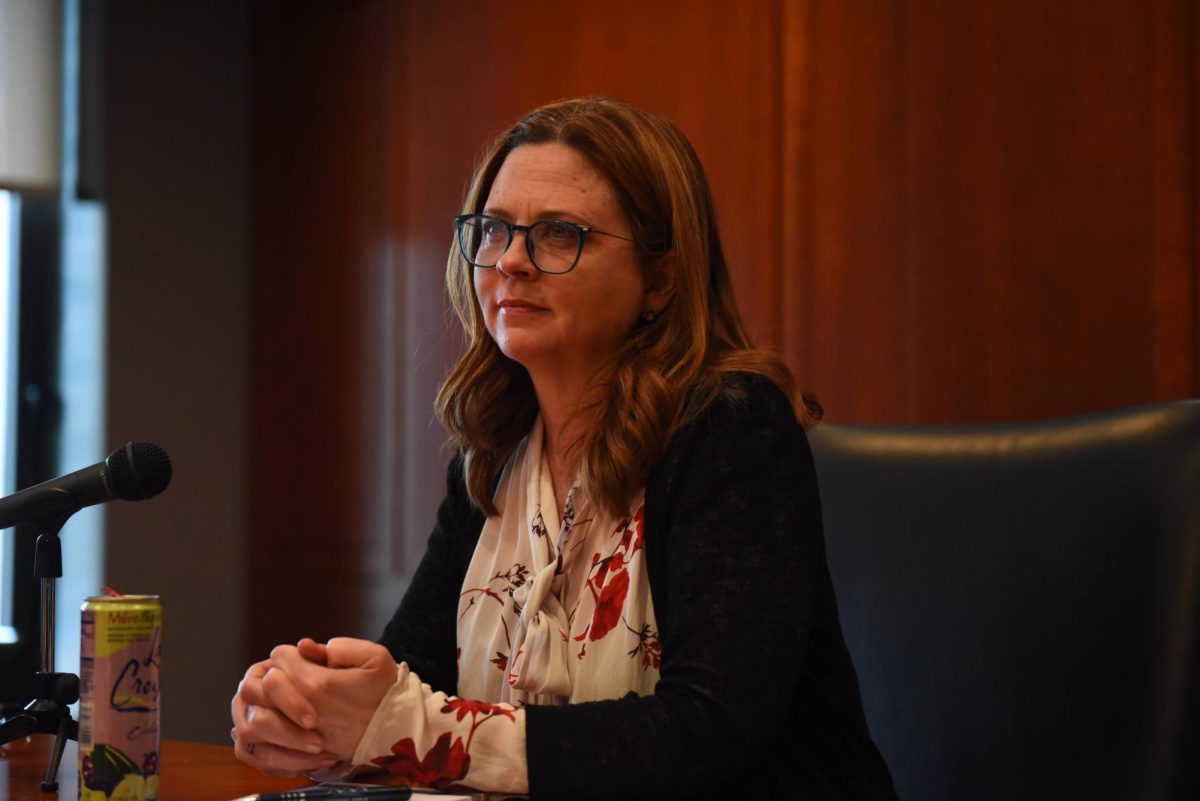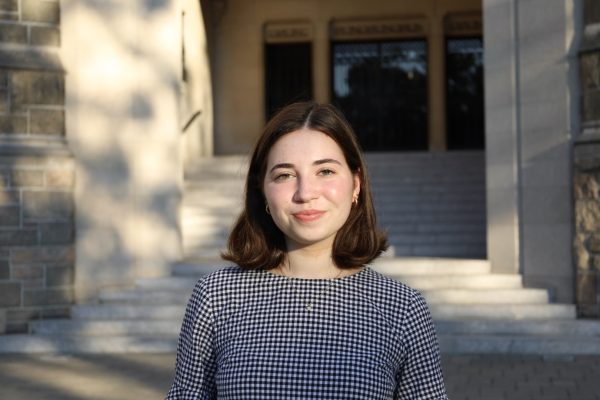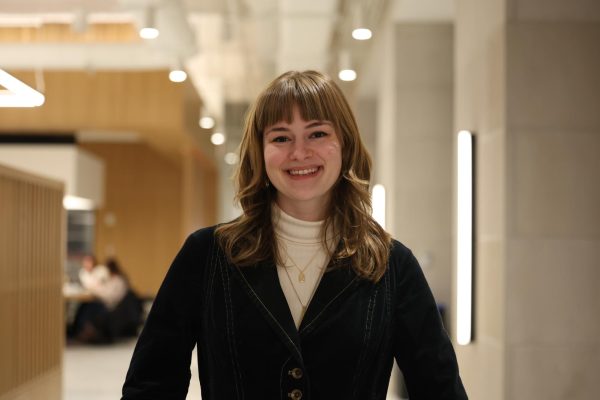Fordham University President Tania Tetlow met with reporters from The Fordham Ram and The Fordham Observer, Lincoln Center’s student newspaper, on Feb. 27. Tetlow discussed a variety of topics such as her plans for the future, rising tuition costs, admissions and campus life.
When asked about her signature goals going forward, Tetlow said that she wants to focus on Fordham’s impact on the world. She stated that $40 million of Fordham’s $50 million EPA grant will be passed to community groups. The remaining $10 million will be used to staff those who will distribute the funds as well as facilitate faculty research. Tetlow stated that the most pressing issue facing Fordham and its students is climate change and environmental justice.
Regarding undergraduate financial aid, Tetlow emphasized that a Fordham education is an investment.
“In terms of broad systemic issues we know that the investment in a Fordham education pays off because we see the outputs of the kinds of jobs and careers that come of it, the quality of the graduate programs, all of that. But we also know how daunting it is to borrow for education.”
Tetlow said that although Fordham’s tuition has increased, the rising cost of higher education is a prominent issue across the country. Tetlow met with members of the House of Representatives and Senate on Feb. 7 to advocate for students and discuss strategies to alleviate financial constraints for families, such as increasing Pell Grants. According to Tetlow, students can expect an announcement regarding the tuition increase for 2024-25 in mid-March.
Recently, the U.S. Department of Education announced that students’ FAFSA data won’t be released until the first half of March. In the past, FAFSA has sent that data in late January. This delay prevents colleges and universities from determining what financial aid students should get until they receive the FAFSA data. Tetlow stated that Fordham was already using a supplemental financial aid form that allows prospective students to receive an estimated financial aid package.
On the topic of admissions, Tetlow said that Fordham will continue its test-optional policy. On Feb. 5, Dartmouth College reactivated standardized testing requirements for undergraduate admission beginning in fall 2025. Similarly, on Feb. 22, Yale University announced they will require standardized testing for first-year and transfer applicants beginning in fall 2025. Tetlow noted that while Fordham is selective, the university is not as highly selective as Ivy League schools such as Dartmouth and Yale — which boast a 6% acceptance rate and 5% acceptance rate respectively.
“We believe strongly that high school GPA and a holistic application review are a better predictor of success [than the SAT or ACT].”
When asked about Fordham’s increase in class sizes, Tetlow shared that a portion of the increase in enrollment was due to COVID-19. Looking forward, Tetlow said the university has long-term plans for renovation, not construction. The university is developing plans to renovate vacant buildings in the Bronx, renovate science classrooms and labs at the Rose Hill campus, and erect a new science building at Rose Hill — once they raise the funds to do so. Tetlow said that STEM facilities have “urgent needs” for renovation.
Tetlow also noted that the university has hired Steven Stainbrook to serve as director of university facilities planning and programming for both the Rose Hill and Lincoln Center campuses in order to plan efficient use of space on the campuses without the need to construct new buildings.
Having grown up in New Orleans, Tetlow said that good food is important to her and she’s aware that the university has room for improvement regarding food quality across campuses. Additionally, she urged students to give the university feedback on what areas Aramark can perform better.
“I’ve met with senior officials at Aramark myself to tell them exactly how much we care about this. When we have the new dining facility here [at Rose Hill] we have the chance to up our game in terms of the quality of what is served here. This is a moment where they know that I have very high expectations.”
Tetlow hosted a lecture on Feb. 14 at St. Ignatius Loyola church titled “Free Speech and Civility on College Campuses.” Summarizing her lecture, Tetlow reflected on the freedom of speech on campuses, stating that speaking out and protesting is an important part of campus life. The president said that her goal is to foster a community at Fordham that is the opposite of “social media land.”
“Regulating the line between academic freedom and protective political speech and threats is necessary but very difficult. That’s a lot of what you’ve seen in the news: what’s a threat and what’s a joke.”
Tetlow hopes that Fordham’s “secret weapon” to combat discourtesy on social media is the Jesuit superpower of discernment. She hopes that the skills of discernment — assuming good intentions, remaining open and curious, listening to the other side of the argument and taking the time to make important decisions — will remain a prominent part of Fordham’s culture.
“These are moments where we want students to engage and we want to give them the grace and the room to do that. I did not, and do not, have all the answers for these issues but that’s some of what we’re up against. It’s not just a question of what we’re free to yell at each other, but it’s also a question of civility.”
Tetlow’s comments carry additional weight considering some of the criticism she has received from student groups like Students for Justice in Palestine in regard to her response to the Israel-Palestine conflict. Tetlow said she has not yet met with students this semester to discuss the conflict, but said she would be happy to do so.
“I am so eager to console the students who are in a great deal of pain, who are most affected by this war. I think that, for the students, they feel so powerless right now. They want to make a difference. They want to make it better, and they are eager for me to do that, to help them in that work, and I find myself in the embarrassing situation of revealing to them I have less power than they imagine that I do.”
Regarding the Fordham Graduate Student Workers Union (FGSW), Tetlow shared that there is a web page with matter-of-fact summaries of each negotiation session. Tetlow said that the university is making progress with FGSW and the Fordham Resident Assistant Union (FRA).
“We try to balance very much trying to do right by everyone who works here — including students who work for us part-time — and also balancing the fact that it’s the undergraduates who pay the graduate student’s full scholarships and teaching and research scholarships.”
In terms of negotiations with FRA, Tetlow said the biggest holdup is that if the university hired staff to do the work of RAs, they could rent out the rooms RA lives in to support the cost of the university. Tetlow said that Fordham is already at the top of the market in comparison to other universities when it comes to RA compensation.
“We are so grateful for the work that RAs do and their ability to teach, be peer mentors and support our students is profoundly higher because RAs are not that much older than the students that they’re helping. That really matters to setting a culture, protecting our students and being there for them through all their struggles.”
During the conversation, Tetlow opened up about the myriad of difficulties that comes with being a university president saying: “It is very hard to navigate complexity and treacherous ground without misstepping sometimes.” Through these difficulties, Tetlow said she often turns to her Catholic faith. “This is what I believe. This is who I am.” Her Jesuit values keep her strong, and she hopes that those same values will continue to shape Fordham.










































































































































































































